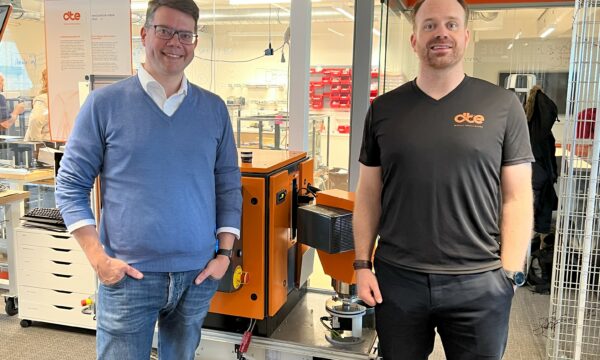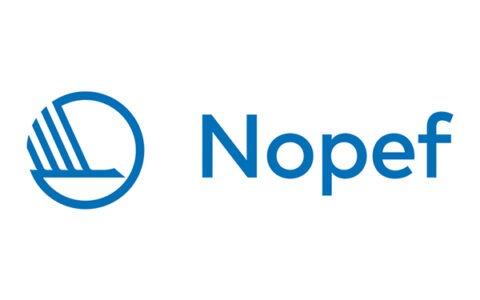13.07.2023 | Case story
Iceland’s DTE has developed a method to test molten metal during production, improving efficiency, safety and results.
Aluminium is one of the world’s most important materials, but producing it requires enormous amounts of energy. The Icelandic company DTE has developed a way to substantially reduce waste during metal production, using an innovative process to analyse molten metals. Nopef provided funding to pave the way for DTE’s pilot programme in America, which turned out better than anyone had anticipated.
“Aluminium production is high-tech and efficient, except in one important aspect: testing the metal during production,” explains Karl Ágúst Matthíasson, CEO of DTE. “The normal process is for someone to put on a protective suit, take a physical sample of the metal, cool it, send it to the on-site lab, analyse it and then determine if any adjustments need to be made. This time-consuming and wasteful process is like the one used a hundred years ago.”
“Working with Nopef was a positive experience. They helped us test and validate our processand are very supportive.”
Karl Ágúst Matthíasson, CEO of DTE
Lasers and machine learning
Aluminium is often used in alloys, mixed with materials like copper, magnesium and silicon, with material ratios varying depending on the end use. Matthíasson uses the analogy of the medieval ‘perpetual stew’, to which new ingredients are constantly added as finished stew is served and eaten.
“But unlike perpetual stew, if one material is out of balance the whole thing is off,” he says. “You might have to reject what you currently have and begin a new batch.”
With current production processes, up to 20 per cent of produced aluminium is out of spec, meaning it needs to be scrapped or reprocessed. As aluminium is responsible for about 3 per cent of the world’s direct industrial CO2 emissions, any efficiency gains can have a huge impact.
DTE developed an ingenious solution that uses lasers focused on liquid metal to create plasma. Sensors detect the atomic spectra emission of each element. AI-based analytics helps interpret the data, enabling unprecedented insight and control over the production process, so out-of-spec batches are minimised.
It was a great idea, but it needed to be proven in the field. DTE approached Nefco with a Nopef funding request for a feasibility study to work in North America with Novelis, a world leader in aluminium.
“We were interested in DTE because their solution offered automation, efficiency and speed in an extremely energy-intensive industry.”
Mikael Reims, Vice President, Origination, Nefco
Efficiency helps save energy
“We were interested in DTE because their solution offered automation, efficiency and speed in an extremely energy-intensive industry. Increasing energy efficiency is an important part of climate change mitigation,” says Mikael Reims, Vice President, Origination, Nefco. “DTE’s solution also promised safety benefits; automating testing means people no longer have to test dangerous molten metal by hand.”
Novelis is the world’s largest aluminium recycler, processing about two million tonnes of scrap annually. Recycling is much better for the environment than processing virgin materials. It uses less energy, keeps aluminium out of landfills and protects biodiversity by reducing mining. The purpose of the feasibility study funded by Nopef was to see if DTE should conduct a pilot with Novelis at a secondary production facility.
“In effect, this was preparatory work for the pilot project,” Mikael explains. “The study helped DTE find suppliers and a local network in Washington State, USA, around the Novelis R&D centre. A potential client might like how an idea sounds, but you need a local pilot project to demystify it. People need to see it working in their local setting.”
The feasibility study encouraged DTE to run the pilot, which succeeded beyond expectations. Novelis was so pleased it was ready to expand their relationship.


New sales and investments
“We agreed with Novelis to provide our solution to all their facilities globally. In addition, Novelis and the European Innovation Council Fund and its investors Metaplanet, Chrysalix Venture Capital and Brunnur Ventures are investing 10 million dollars in DTE,” says Matthíasson. “This is a direct result of Nopef funding our feasibility study.”
A study by the International Aluminium Institute forecasts that demand for the metal will grow by almost 40 per cent by 2030, so DTE’s solution is projected to see significant demand.
“Working with Nopef was a positive experience. They helped us test and validate our process,” says Karl. “If you are a Nordic entrepreneur with a green business idea, you should give them a call and talk to them directly. They are very supportive.”
Learn more about the Nopef application criteria and apply for funding
Text: David J. Cord